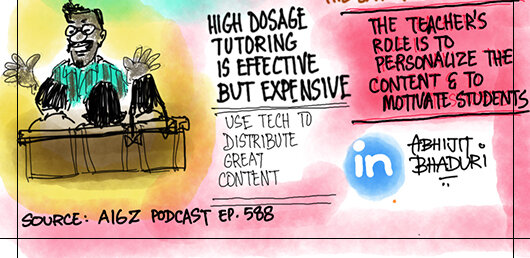Online learning - is it better
When the lockdown began, education went through a forced pivot (along with many other things like healthcare, retail and the office, of course). Is online education effective and what is the problem EdTech should solve for instead?
Online Education
Pedagogy first, then the medium
It can make college much cheaper. But Massive Open Online Courses (MOOCs) have not been able to replace college because being in college is a very different experience. Here are some free MOOCs you can take. For children going to school, online learning takes away the opportunity to build social skills and is not very effective in peer-group learning. Several helicopter parents stay out of the screen but prompt the child with the ‘correct response’, thus severely damaging the learning experience. Frequent testing is one of the best ways to learn at all ages. Being seen as the smartest baby is not a great way for the kid to learn (neither is it useful for an adult).
What is effective is not cost-effective
Online Education
Small group tutoring in high doses is very effective. But is not cost effective. When businesses allocate a coach for their high potential employees, they are providing the equivalent of high dosage tutoring. But it is expensive.
Imagine if every student could have access to a life coach. What is every employee could work with a leadership coach. In a conversation with the Director of MICA, Ahmedabad, (full disclosure: I used to be on the MICA Governing Council) I learnt that the professors record a 30 minute ‘lecture’ which the students watch ahead of the class. The next day, the group of students use their time to have discussions with the professor. The projects, assignments and tests reinforce the learning further.
Fewer content creators - more tutors
Content creation is a complex task: What if content creators was left to a team of instructional designers, academics, storytellers, animators, video and audio creators. They could create short form and long form content that is engaging and interactive. If the content has already been created and can be used by the teacher, it is infinitely better than listening to someone standing before a camera and droning on.
Multiple perspectives: Have unique perspectives (even when they are opposing views):Having one single content provider is dangerous. Education is one of the first places authoritarian states attack when they want to shape young minds. This awesome TED talk tells you about the “Danger of a Single Story”
Personalisation: The role of the teacher/ instructor or coach can be to personalise the content to the context of the learner. That means being able to slow down or speed up depending on the student’s ability.
Building habits: But the most important role of the teacher is to be able to simplify the idea and create opportunities for the student to apply the learning. The teacher can help the student to progressively become a self-starter. The role of the teacher is motivate and inspire and build great habits.
Online Education
Is online learning just as effective for you as in-person learning? Do let us know what is your experience. Thanks for leaving a comment here. Here is a #Sketchnote to summarise the articleI will be adding this to my weekly newsletter as the lead story. There are more ideas there. Get them every week in your mailbox by adding your email here https://abhijitbhaduri.substack.com/
Here is the podcast and the TED talk I have referenced in my article https://a16z.simplecast.com/episodes/the-ed-techdebate
https://www.ted.com/talks/chimamanda_ngozi_adichie_the_danger_of_a_single_story?language=en





